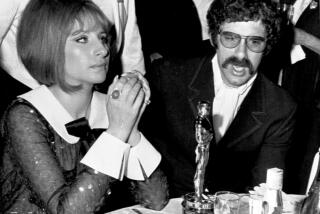Elvis Expert Has Left the Campus but Not Quest to Show King’s Importance
- Share via
OXFORD, Miss. — When Vernon Chadwick went to Dartmouth, it didn’t take him long to start disguising his accent. All it took were his classmates’ smiles when they heard his drawl, and their questions: He was prejudiced, right? Didn’t they still lynch blacks in Mississippi?
He was a Southern boy in a Northern world, and it wasn’t good.
But then he went to England’s Oxford University, and there, on Aug. 16, 1977, something happened that helped rid him of his Southern inferiority complex:
Elvis Presley died.
Not that this was a good thing in itself. Far from it. But on that day, Chadwick discussed the King’s impact on American culture, and his teachers encouraged him to explore the phenomenon academically.
Elvis had saved him, and had set him on his course. He would explore the importance of Elvis; he would shake up the stodgy academic establishment by finding meaning in a man often dismissed as the gluttonous, tasteless pinnacle of trailer trash--the stereotypical Southern boy.
But if Elvis demonstrates the dark side of the American dream, the danger of overwhelming success and celebrity, the rock ‘n’ roll professor offers his own cautionary tale.
With his annual Elvis conferences, he has suffered ridicule in the national press. Sponsors, peers and, finally, his university all turned their backs--victims, Chadwick says, of the same inferiority complex he once endured.
He has lost his job. But Vernon Chadwick will not give up on Elvis.
“I think of Vernon like the mythical tale of Icarus, seeking to fly toward the sun, then falling to Earth,” says William Ferris, who heads the Center for the Study of Southern Culture at the University of Mississippi. “I think he is a prophetic type of academic figure and, like any prophet, he incurred both admiration and controversy.”
“Vernon,” Ferris says, “was sacrificed on the cross of Elvis.”
*
Forty-three years have gone by since Elvis Aron Presley made his first recording; nearly 20 years have passed since he (purportedly) died. But in Vernon Chadwick’s heart--indeed, in the hearts of millions--the King still lives.
His record sales top half a billion, and the hits keep on coming, thanks to newly unearthed or repackaged recordings. His Memphis home, Graceland, attracts 700,000 visitors a year. Fifty new Elvis books have been published in this decade alone, and he continues to inspire thousands of impersonators and imitators.
Chadwick, a lean and youthful 44, can go on for hours about how the King provides gateways to countless study topics.
There is Elvis the liberator, battling postwar America’s repression of free expression and open sexuality. And Elvis as civil rights figure, bringing black music, dance and style to white audiences, doing for integration in song what Dr. Martin Luther King Jr. did in sermon.
Then there’s Elvis the multiculturalist. Hey, says Chadwick--just check out the international harem that joins Elvis for the closing song in “Girls! Girls! Girls!”
And don’t forget the spiritual Elvis, stirring his fans with gospel songs and a Vegas act Chadwick compares to a Pentecostal revival.
Chadwick even sees Elvis’ influence on our president, an avowed Presley fan.
Bill Clinton’s “feel your pain” empathy with his audiences? His reputed appetites for food and sex? The way he holds a microphone?
Elvis, Elvis and Elvis once again.
“Elvis to me names the true fabric of American society,” Chadwick explains. “That range mapped by Elvis is truer to the American experience than any other you can turn to.”
It was in 1990, after stops at Freiburg University in Germany and at Yale, where he earned his doctorate in comparative literature, that Chadwick came to the University of Mississippi, with its oaks, magnolias and antebellum buildings.
He was a man on a mission: He would rebel against academic tradition, making education fun, inclusive and “funky.”
So Chadwick led study trips through Europe by bicycle. He combined twirlers, Southern belles, feminism and nudist art in one study, and compared the Nazi swastika to the Confederate battle flag for a graduate course.
In the center of it all, of course, was Elvis.
In 1992, Chadwick first taught “Blue Hawaii,” comparing Herman Melville’s Polynesian novels and Elvis movies set in Hawaii, analyzing their respective treatments of race, culture and social injustice. Far from being an easy A, his students say the “Melvis” class was challenging and at times overwhelming, what with its applications of Freud, Levi-Strauss and 18th century historical narratives.
Three years later, Chadwick was ready for the next step--the First International Conference on Elvis, a pop-culture counterpoint to the university’s annual high-culture conference on native author William Faulkner.
Chadwick was backed by Ferris, who had returned to his home state to direct the Southern Culture center, his ears ringing from the japes of Yale colleagues who labeled “Southern culture” an oxymoron.
For a week, scholars and authors presented papers and discussed Elvis in all his variations, interspersed with plenty of musical interludes from a barrage of Big E impersonators.
Among the participants? Folk artist Howard Finster, who told of a recent visit to his “Paradise Garden” by Presley, who declined his invitation to stay. “Howard, I’m on a tight schedule,” he told Finster.
The conference got plenty of attention. Not surprisingly, not all of it was good.
“The professors organizing this jamboree should resign their positions or at least set up a rotational basis where they teach one semester and the Elvis impersonators get the other,” said Stephen Balch, president of the National Assn. of Scholars.
And Oxford--a town proud to claim Faulkner and living authors such as John Grisham and Barry Hannah, but a town that is still trying to live down its state’s redneck reputation and its own 1962 riots over campus integration--was far from thrilled.
A consultant wrote Ferris: “I wonder if it doesn’t reinforce some people’s opinions that the state of Mississippi and its university are pretty much a backwoods redneck culture.”
Before long, Chadwick received notice he was denied tenure. He appealed--and promptly set about organizing the second Elvis conference for ‘96, lining up a new round of academics and oddities, including Elvis Herselvis, a lesbian impersonator from San Francisco.
First, Graceland withdrew from the conference. Then, so did the town of Tupelo. Finally, Provost Gerald Walton declared that, as far as the university was concerned, it would be the last Elvis conference.
And last spring was Chadwick’s final semester at Ole Miss.
*
Elvis and his professor may have left the campus, but the King lives on in his teaching apostle.
While the university commemorates the 100th anniversary of Faulkner’s birth this summer, Chadwick, bankrolled by a like-minded Memphis businessman, staged a third Elvis conference last week hosted by the Memphis College of Art. Nightly musical entertainment included El Vez, the Mexican Elvis.
He’s also offering his Melville-Elvis course on a Caribbean cruise this summer. And he’s founded the Institute of the Living South, which he hopes to build into a center for his own brand of scholarly exploration.
He is a man who is focused on the future, not the past--except for a past that wore blue suede shoes and finally gold lame, a past that ended on Aug. 16, 1977, though it lives on for those who believe.
“Elvis,” he says, “has never disappointed me.”
More to Read
The biggest entertainment stories
Get our big stories about Hollywood, film, television, music, arts, culture and more right in your inbox as soon as they publish.
You may occasionally receive promotional content from the Los Angeles Times.










